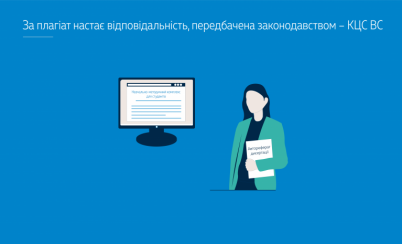Contact center of the Ukrainian Judiciary 044 207-35-46

It is plagiarism to cite a work of a scholarly nature in another work for educational purposes without giving the name of the author and the source of the citation.
In the event of proven infringement of the rights of a copyright holder, in particular in the case of plagiarism, compensation for the infringement of non-property and property rights is subject to recovery.
This legal conclusion was reached by the Supreme Court, composed of the panel of judges of the Second Judicial Chamber of the Civil Cassation Court, in a case concerning a claim for infringement of personal and property rights and the recovery of damages.
The plaintiff highlighted that the defendant's website (a state higher education institution) had published an educational and methodological complex for students authored by the co-defendant, an associate professor of the university department, which had utilised part of the abstract of the plaintiff's dissertation for the degree of Doctor of Economics. As the plaintiff did not grant the defendants permission to use her abstract, she considered that her non-property and property copyrights had been infringed and sought damages.
The court of first instance, whose decision was upheld by the court of appeal, dismissed the claim on the grounds that the law provides for the possibility of reproducing an extract from a work without the author's consent if the work was created for educational purposes and another work in which the extract is reproduced was also created for that purpose. Reproduction of part of the plaintiff's abstract in the educational and methodological complex is possible even without the author's consent, as it is a free reproduction of a copy of the work for study.
The Supreme Court disagreed with this conclusion and stated that, as a general rule, the use of a work as an object of intellectual property rights by another person is subject to the permission of the person who has the exclusive right to authorise the use of that object.
Every citizen has the right to the results of his intellectual and creative activity; no one may use or distribute them without his consent, with the exceptions established by law (Article 54 of the Constitution of Ukraine).
By way of exception, a work may be lawfully used as an object of intellectual property rights without the permission of a person who has the exclusive right to authorise its use, if this is provided for by the relevant provision of law.
Citation is the free use of a work with the name of the author and the source. By its very nature, citation is the most significant limitation of copyright. It serves as a kind of foundation for other copyright restrictions.
The Supreme Court stressed that the condition for the legitimacy of the quotation is the indication of the name of the author of the work and the source from which a particular quotation is borrowed, which should indicate the origin of the quoted work used without the author's permission.
The opposite of using a work as a positive action is plagiarism. Plagiarism is, in particular, the use of quotations from another work (part of a work) without reference to the source, i.e. without observing a condition for the legitimacy of a quotation, such as indicating the name of the author of the work and the source.
The arguments that the editors of the newspaper "Textbooks and Manuals" had the right to use the disputed artistic work without the author's consent because it was used in educational publications do not deserve attention, as they are refuted by the evidence collected in the case and the defendant has not proved the use of the disputed artistic work to the extent justified by the purpose of illustration in educational publications.
Infringement of copyright and (or) related rights, which gives rise to protection of such rights, including judicial protection, is among other things plagiarism - the disclosure (publication), in whole or in part, of another's work under the name of a person who is not the author of that work.
In the event of proven infringement of the rights of the copyright holder, in particular in the event of plagiarism, compensation will be recovered. In order to make a claim for compensation, it is sufficient to provide evidence of acts that constitute copyright infringement. In order to determine the amount of such compensation, the following shall be taken into account: the fact of the infringement and the nature of the infringement; the duration and extent of the infringement (single or repeated use of the disputed items); the principles of private law (good faith, fairness, reasonableness).
In this case, the courts took into account the fact that the defendant used the work without fulfilling one of the conditions for the legitimacy of the quotation, such as indicating the name of the author and the source. In view of the fact that the courts found that there had been plagiarism (part of the plaintiff's abstract had been used without mentioning her name and source), the SC ruled that the claim for compensation should be satisfied.
The Resolution of the Supreme Court of 17 January 2024 in case No. 308/7570/18-ц (proceedings No. 61-7051св23) - https://reyestr.court.gov.ua/Review/117473137.
This and other legal positions of the Supreme Court can be found in the Database of Legal Positions of the Supreme Court - https://lpd.court.gov.ua.